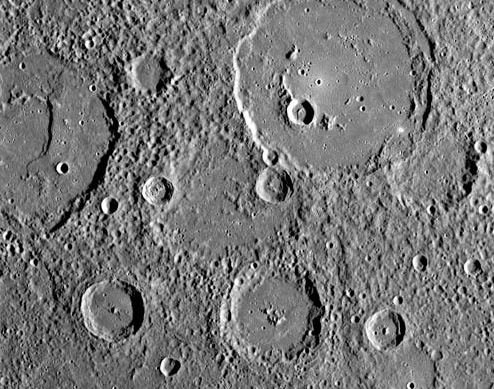MERCURY
Mercury is 58 million km. from the Sun.
It is the closest planet to the sun.
It takes only 88 Earth days for Mercury to orbit the Sun.

a close-up up Mercury's surface, taken by the spacecraft Messenger (2008)
Photo: NASA/Johns Hopkins University Applied Physics Laboratory/Carnegie Institution of Washington
The planet is bare and rocky with many craters
formed by
all the meteoroids and comets that have crashed into
the planet.
Since Pluto was named a dwarf planet in 2006,
Mercury is now the smallest planet
in our solar sysem.
It is only a little bigger than
our moon. Mercury has no moon.
It does not
have any water and has almost no atmosphere.
Like Earth, Mercury has cliffs and valleys.
Some cliffs are a mile high.
The planet rotates on
its axis very slowly, once in 59 Earth days.
Its
coldest temperature is -170 degrees Celsius
which is very very cold (-280 degrees F).
The hottest temperature is 430 degrees Celsius
(800 degrees F) which is very very hot.

Mercury, photo taken January 2008, by Messenger spacecraft
a larger view ; photos courtesy of NASA
Little was
known about Mercury before 1974.
Scientists had
a hard time studying Mercury with
telescopes
because of the Sun's bright glare.
In 1974 and 1975 an unmanned spacecraft
named Mariner 10
flew by Mercury three
times and sent us information.
Thirty years later in 2004 NASA launched
a spacecraft
named MESSENGER to study Mercury.
After three flybys it will begin to orbit Mercury in 2011.

space art - the
surface of Mercury with Mariner 10 in the sky.
Mercury was named after an ancient Roman Messenger of the Gods.
The god Mercury had winged sandals which gave him super speed.
Mercury is very fast. It speeds around the Sun faster than the other planets.